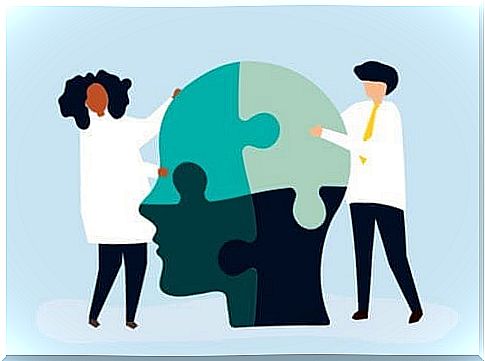Psychosocial Intervention In Mental Health

According to the World Health Organization (WHO), health is a state of complete physical, mental and social well-being and not just the absence of ailments or diseases. To achieve or maintain this state, you can use different strategies in different areas. One of these areas of knowledge is psychosocial intervention.
Before we talk more about this, it is important to understand what psychosocial intervention is. According to Alvis (2009), psychosocial intervention is a process that aims to increase the developmental ability of people, their families and society.
It allows individuals to exercise control and power over their individual and social environment. Thereby it increases the well-being and quality of life of individuals. It trains them and gives them individual tools that enable them to solve problems and make changes in their social environment.
What is mental health?
As Oramas, Santana and Vergara (2013) said, mental health consists of learning about reality and then transforming it through confrontation, management and integration of conflict resolution – both internally for the person and those around the person.
When there is a disruption in this learning process, or if the person fails in his attempt at a solution, one can start talking about illness.
Other writers such as Riviere said a bit a la the same that mental health is perceived as the ability to maintain dialectical and transformative relationships with the world, allowing the resolution of the individual’s internal contradictions as well as those associated with their social context (quoted by Oramas, Santana and Vergara, 2013).
According to the World Health Organization (WHO), mental health is defined as: ” A state of well-being where each individual is aware of his or her own potential, can cope with life’s normal stress triggers, can work productively and is able to contribute to society .”

Cruical factors
Although people’s ability to deal with everyday conflicts and transform their reality is of great importance, there are other crucial factors when it comes to mental health.
- The social context. Cases of poverty, abuse or belonging to a minority group.
- Family background.
- Coexistence with other chronic diseases.
Psychosocial intervention is performed through two interrelated contexts: psychological and social. The individual must start by taking into account his entire social environment. When intervening, it is important to keep in mind how important the primary professional really is.
This is the closest and most accessible service. From there, the experienced professionals can evaluate the patient and send him or her on in the system.
One thing we need to keep in mind is that the coordinated efforts of the various professionals are important to achieve the various goals. While pharmacological treatment may be important, it is also important that we do not forget the importance of psychosocial intervention.
As indicated in the guide entitled Good Practices in Intervention for People With Mental Illness (2016), this intervention should include social support, monitoring, mentoring and social rehabilitation. The primary purpose of this practice is to contribute to the autonomy of the individual person suffering from mental illness.
The individual must have individual and personalized attention. Here are some things to keep in mind:
- The needs of the individual.
- Support from their family or closest circle.

Psychosocial intervention in people with mental illness includes:
- Activities related to their living situation: Supervision, help with looking for housing, etc.
- Daily activities.
- Support for daily activities.
- Supervision and training in medication administration.
- Guidance when working with organization and time management.
- Training to function in a social life and a family life.
- Socio-legal guidance.
In short, people today are more aware of the importance of mental health compared to a few years ago. But there is still much more we need to learn about and understand in terms of mental illness. Little by little, we as a society must become more empathetic, tolerant and informed on this subject.
For this and other reasons, it is important to encourage those who need it to see a professional who can help them understand how useful psychosocial intervention can be for them.








